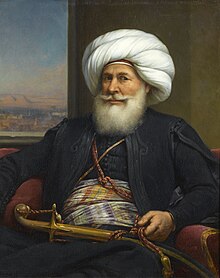Kavalalı Mehmed Ali Pasha
| Muhammad Ali Pasha | |
|---|---|
|
Wāli of Egypt, Sudan, Sham, Hejaz, Morea, Thasos, Crete 
|
|

An 1840 portrait of Muhammad Ali Pasha by Auguste Couder
|
|
| Reign | 17 May 1805 – 2 March 1848 |
| Predecessor | Ahmad Khurshid Pasha |
| Successor | Ibrahim Pasha |
| Born | 4 March 1769 Kavala, Macedonia, Rumeli eyalet, Ottoman Empire (present-day Greece) |
| Died | 2 August 1849 (aged 80) Ras el-Tin Palace, Alexandria, Egypt Eyalet, Ottoman Empire (present day Egypt) |
| Burial | Mosque of Muhammad Ali, Cairo Citadel, Egypt |
| Wives |
|
| Issue | Tevhida Ibrahim Pasha Tusun Pasha Isma'il Hatice (a.k.a. Nazli) Sa'id Pasha Hassan Ali Sadik Bey Muhammad Abdel Halim Muhammad Ali the Younger Fatma al-Ruhiya Zeinab |
| Albanian | Mehmet Ali Pasha |
| Arabic | محمد علي باشا |
| Turkish | Kavalalı Mehmet Ali Paşa |
| Dynasty | Muhammad Ali Dynasty |
| Father | Ibrahim Agha |
| Mother | Zeinab |
| Religion | Bektashi Islam, Alevi Islam |
Wāli of Egypt, Sudan, Sham, Hejaz, Morea, Thasos, Crete
Muhammad Ali Pasha al-Mas'ud ibn Agha (Ottoman Turkish: محمد علی پاشا المسعود بن آغا; Arabic: محمد علي باشا / ALA-LC: Muḥammad ‘Alī Bāshā; Albanian: Mehmet Ali Pasha; Turkish: Kavalalı Mehmet Ali Paşa; 4 March 1769 – 2 August 1849) was an Ottoman Albanian commander in the Ottoman army, who rose to the rank of Pasha, and became Wāli, and self-declared Khedive of Egypt and Sudan with the Ottomans' temporary approval. Though not a modern nationalist, he is regarded as the founder of modern Egypt because of the dramatic reforms in the military, economic and cultural spheres that he instituted. He also ruled Levantine territories outside Egypt. The dynasty that he established would rule Egypt and Sudan until the Egyptian Revolution of 1952 led by Muhammad Naguib and Gamal Abdel Nasser.
...
Wikipedia
